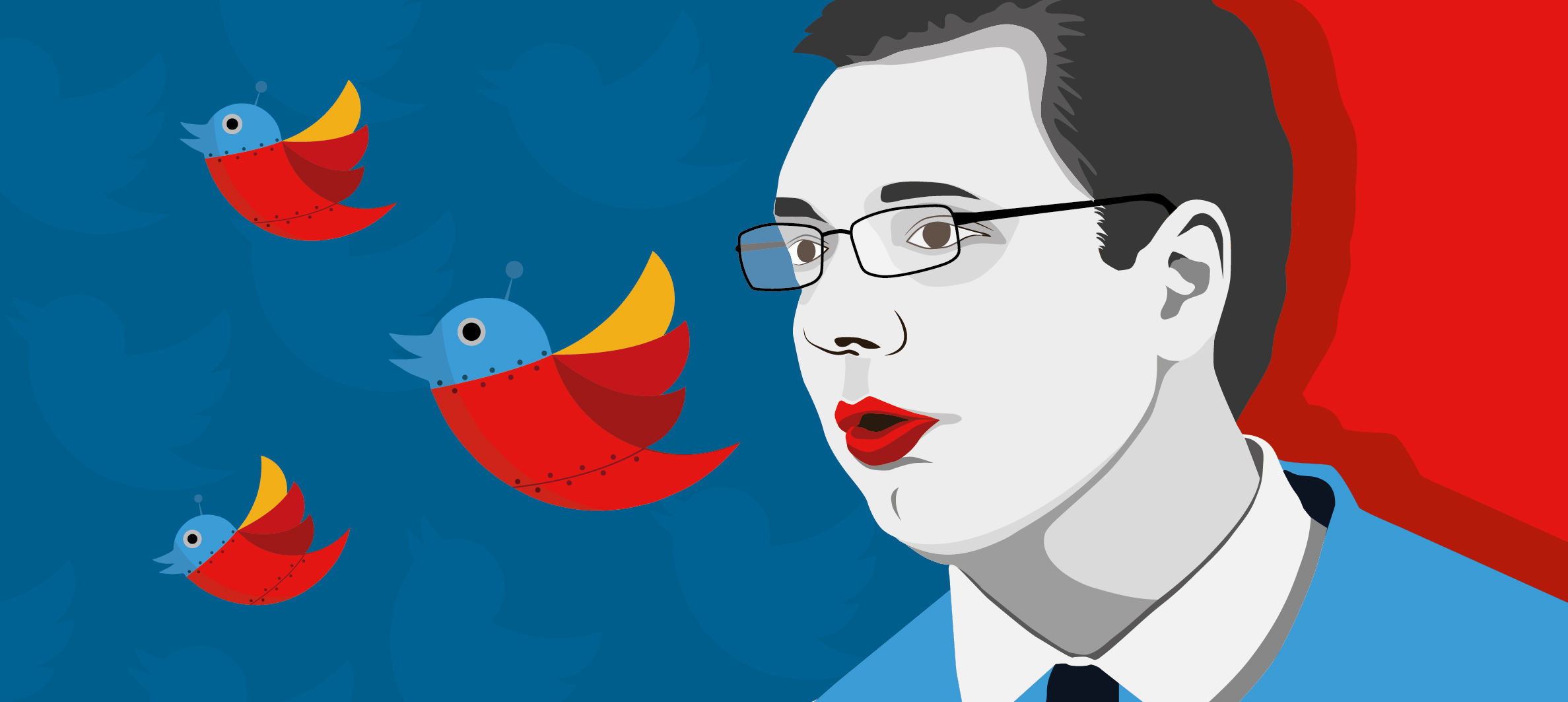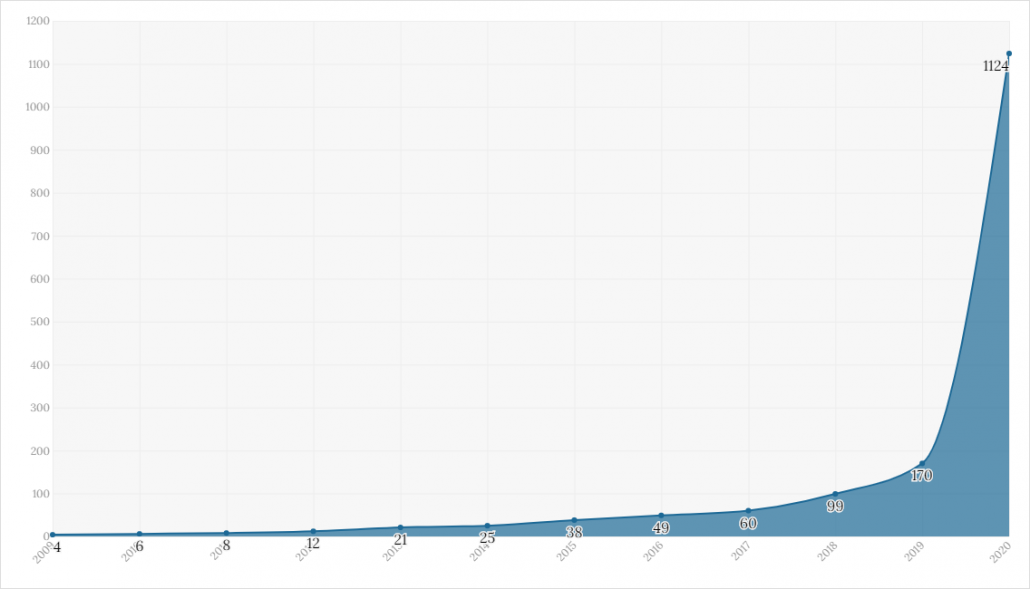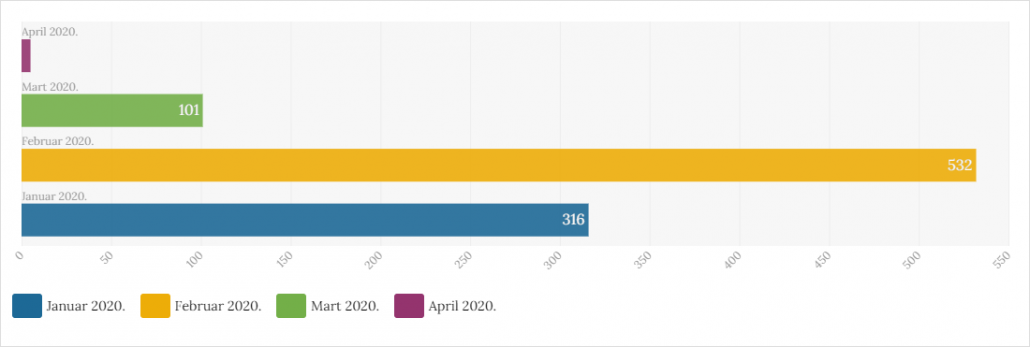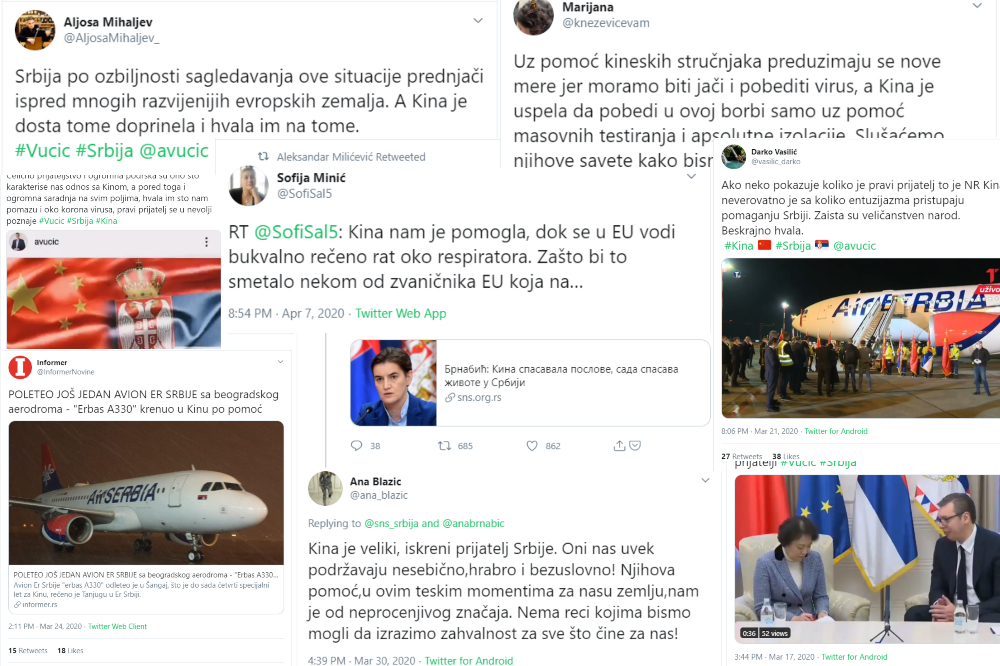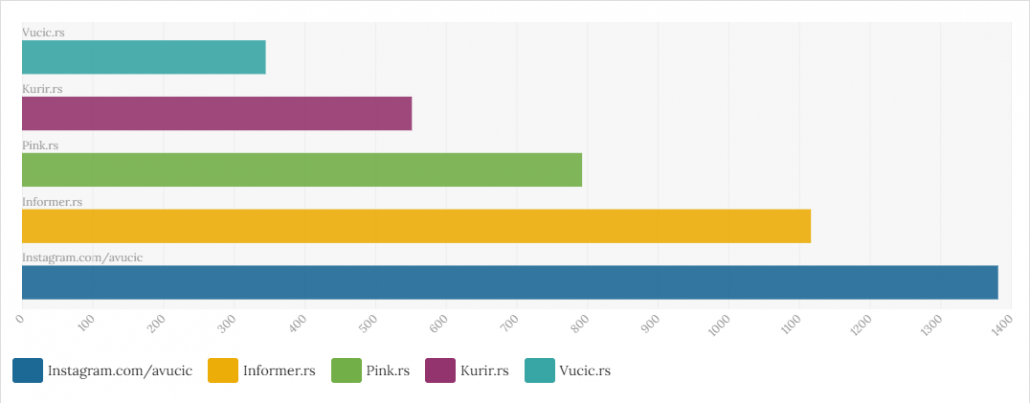Analyzing posts on Twitter for the period from March 9 to April 9, we discovered 30,000 tweets coming from accounts in Serbia with keywords Kina (China) and Srbija (Serbia) in their content. As much as 71.9 percent of the content was produced by “bot“ accounts.
A huge pro-government network of “bot“ accounts wrote and praised the Chinese aid and the friendship between the two countries, amplifying the visibility of tweets by retweeting. The analysis shows the approach, tactics and reach of the campaign.
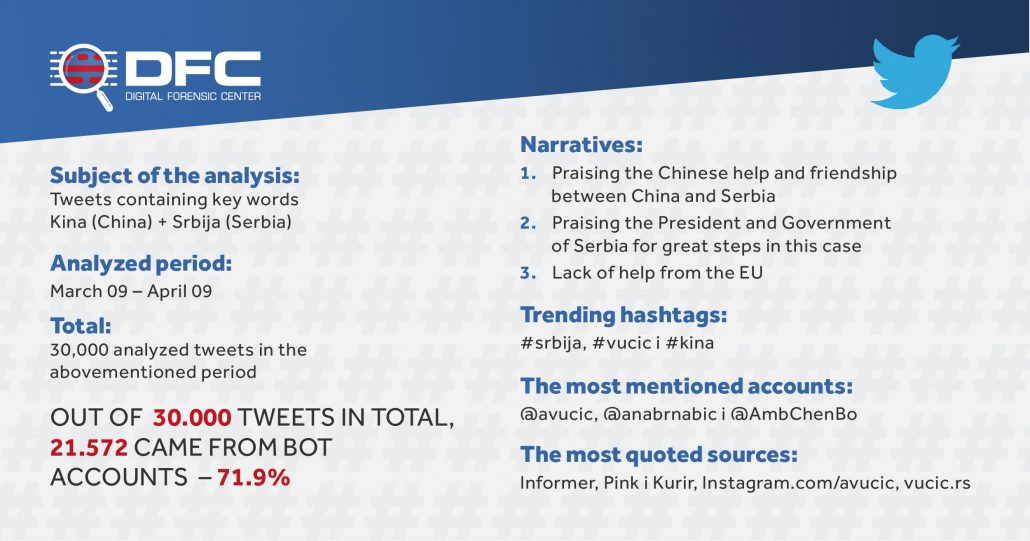
Beijing dearer than Brussels
Even though Twitter announced recently that it removed several thousand accounts from the network, mostly serving to promote Serbian President Aleksandar Vucic and his political party, the Digital Forensic Center’s analysis shows that the botnet is still active in Serbia – this time it promotes the Chinese aid to the country during the coronavirus epidemic.
Many times, during the epidemic, Vucic has praised the aid from China and Russia, while criticizing the European Union. Thus, he stated that he believes in his brother and friend Xi Jinping, adding that China is the only country that can help them. After China had sent its aid consisting of experts and medical equipment to Serbia, the billboards of gratitude followed, displayed by the Serbian tabloid Informer on its own-initiative at several locations in Belgrade.
On the other hand, Vucic has strongly attacked the EU and said that the European solidarity does not exist and that it is all a fairy tale on a sheet of paper. The similar opinion shared Serbian Minister of Foreign Affairs Ivica Dacic, who said that China can help them at the moment, while the donations of the European union are reflected only in a flight bringing aid from India. This „only“ accounts for EUR 7.2 million for cargo-only flights.
Brussels reallocated about EUR340 million in non-refundable aid for the Western Balkan countries, the most of which will go to Serbia – 15 million in immediate support to healthcare sector and 78.4 million to mitigate the coronavirus impacts. Besides, the EU supports constantly the healthcare sector in Serbia. Since 2000, the Union has provided EUR450 million in grants and the EIB loans for hospitals all around Serbia, the Torlak Institute, ambulances equipped with respirators, and virus testing equipment.
Despite the EU’s aid, Twitter shows an active campaign aiming at promoting the Chinese aid and creating false perception among other users.
A network of “bot” accounts
A detailed analysis of 30,000 tweets showed that 21,572 of them (71.9 percent) were produced by “bot” accounts.
Unique 1,124 “bot” accounts were identified in the analyzed content.
Analyzing content, it can be seen that the primary task of this large network of accounts was to praise the Serbian-Chinese friendship, as well as the significance of the Chinese aid during the coronavirus epidemic. On the other hand, the content criticizing the EU and its alleged lack of help was also present.
While some accounts were created as early as 2009, the analyzed botnet has begun to grow in 2018, when the „One in five million“ protests were being organized all over the country, it continued to grow in 2019, and saw its first expansion in the first quarter of 2020, when 954 accounts were created.
For the given period, the analyzed “bot” accounts had 186,584 followers in total, or 166 followers per account on average.
Out of all 21, 572 “bot” account tweets, 18,422 or 85.4 per cent were retweets, which is one of the key characteristics of such accounts and networks. This shows that their goal was to amplify the reach of the existing content, and not to create the new and original one.
Within the frame of the analyzed sample, the two accounts with the largest number of tweets concerning the topic of China and Serbia were: @opancina_nevena with 135 tweets and @UDrskNYdBGfZzpA with 138 tweets, and all 273 of them were retweets. Hence, there was no original content.
Out of 3,150 original tweets, 1,134 tweets (36 percent) did not show engagement (likes or retweets), while the average of engagement is 7,79 per tweet.
Narratives
The analysis demonstrates that the content (tweets) can be grouped into three categories, in accordance with the narratives that they spread:
- Praising the Chinese aid and friendship between China and Serbia
- Praising the President and Government of Serbia for great steps in this case
- Lack of help from the EU
Generally speaking, the accounts were continuously praising Vucic, Serbian Government and China – by retweeting and responding with positive messages to the content in connection to them.
Some of the opinions is that China was in a difficult situation but it fought it out successfully, therefore, it is aware of the difficulties that Serbia is facing. Thankfulness for honest friendship is expressed in the tweets, while the focus is on the efforts of “two fraternal nations that will defeat epidemic together “.
Additionally, it is emphasized that President Vucic strengthened the position of Serbia in the world with his politics and that is why Russia and China are also helping Serbia. It is also indicated that the members of the Chinese administration were pleasantly surprised with concrete actions and measures that the Serbian Government took during the spreading of the dangerous disease.
The EU is also criticized, i.e. the alleged lack of its help. Reportedly, China is sending the packages and goods and the EU is only financing transport from China to Serbia.

Examining mentions and retweets in the analyzed sample demonstrates the extent to which this operation was concentrated on Vucic, China and sources from the pro-Government media. Accounts @avucic, @AmbChenBo (Chinese Ambassador to Serbia) and @anabrnabic (Serbian PM) were mentioned in 11,346, 460, and 270 tweets.
The accounts did not only mention Vucic @avucic (and other accounts in connection with this one) but they also “pumped” the hashtags #vučić, #brzejacebolje (#fasterbetterstronger), #celicnoprijateljstvo (#ironfriendship), #srbija and #kina.

Another noted activity was the promotion of the content coming from different addresses, close to Serbian authorities.
Therefore, the Instagram profile of President Vucic, his official site www.vucic.rs, the pro-government Informer, Kurir tabloids and TV Pink were the external sources that the bots usually made reference to.
Conclusion
By analyzing data from 30,000 accounts referring only to China and its aid to Serbia during last month, we are concluding that the activities of the “bot” accounts are still present in that country, which was also detected by Twitter. Similar campaigns are always amplified when a country is ahead of the important events, such as the elections in Serbia that are envisaged for this year.
Such activities have recently been seen in Brazil, Venezuela, Saudi Arabia, Turkey, Egypt, India and all of them have the same goal – to raise visibility and popularity of particular content in order to redirect public opinion to a preferred direction.

